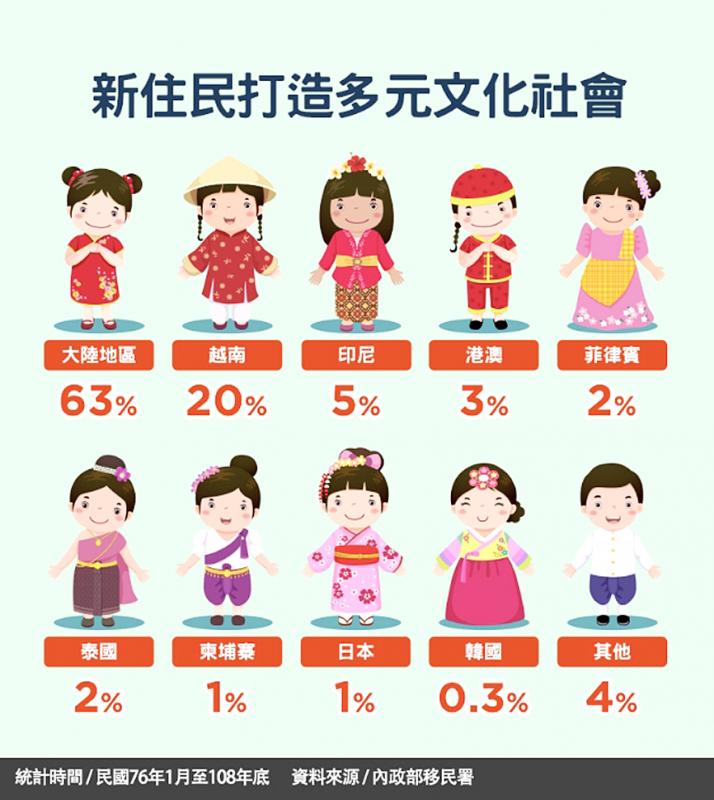The Ministry of Education is drafting an amendment that would allow “new immigrants” to enroll in local universities without taking entrance exams, with the policy expected to take effect in the second half of next year at the earliest.
There are more than 650,000 new immigrants who hold Republic of China (ROC) identification cards, exceeding the number of Taiwan’s Aborigines and making them the fifth-largest population group in the nation, the ministry said on Saturday.
Before an immigrant becomes a naturalized ROC citizen — a process that usually takes four to eight years — they can enroll in Taiwanese universities like other foreign students by using their high-school academic record from their home country.

Photo taken from the National Immigration Agency Web site
However, after they are naturalized, new immigrants who want to study at local universities have to take the college entrance exam like any other Taiwanese student, the ministry said, adding that the exams can be challenging for those who did not finish high school in Taiwan.
To offer naturalized citizens better opportunities to study in Taiwan, the ministry is drafting an amendment to Article 25 of the University Act (大學法) to facilitate their enrollment in higher-education programs, it said.
Each university department would be given an additional 2 percent quota for admitting naturalized students, in addition to its original authorized quota of students, the draft amendment says.
Yang Hsiao-mei (楊小梅), who moved from Vietnam to Taiwan with her family when she was nine, said that Taiwan’s college entrance exams are difficult for immigrants.
Yang, previously director of the academic affairs office at New Taipei City’s Golden Dragon Primary School, is to become the nation’s first elementary-school principal from an immigrant background.
She praised the proposed amendment, saying it would motivate naturalized citizens to pursue higher education, which would be beneficial for their work prospects.
Aside from increasing the admission quota, the ministry should also have supplementary educational resources ready for naturalized citizens, National Parent Education Volunteer Association chairman Wu Fu-pin (吳福濱) said.
The quota for immigrant students is additional and would not affect the rights of Taiwanese students, former Shih Chien University president Michael Chen (陳振貴) said.
Chinese spouses, who are governed by cross-strait regulations, would still be required to take the exams to enroll in Taiwan’s universities, he added.

Taiwanese can file complaints with the Tourism Administration to report travel agencies if their activities caused termination of a person’s citizenship, Mainland Affairs Council Minister Chiu Chui-cheng (邱垂正) said yesterday, after a podcaster highlighted a case in which a person’s citizenship was canceled for receiving a single-use Chinese passport to enter Russia. The council is aware of incidents in which people who signed up through Chinese travel agencies for tours of Russia were told they could obtain Russian visas and fast-track border clearance, Chiu told reporters on the sidelines of an event in Taipei. However, the travel agencies actually applied

Japanese footwear brand Onitsuka Tiger today issued a public apology and said it has suspended an employee amid allegations that the staff member discriminated against a Vietnamese customer at its Taipei 101 store. Posting on the social media platform Threads yesterday, a user said that an employee at the store said that “those shoes are very expensive” when her friend, who is a migrant worker from Vietnam, asked for assistance. The employee then ignored her until she asked again, to which she replied: "We don't have a size 37." The post had amassed nearly 26,000 likes and 916 comments as of this

New measures aimed at making Taiwan more attractive to foreign professionals came into effect this month, the National Development Council said yesterday. Among the changes, international students at Taiwanese universities would be able to work in Taiwan without a work permit in the two years after they graduate, explainer materials provided by the council said. In addition, foreign nationals who graduated from one of the world’s top 200 universities within the past five years can also apply for a two-year open work permit. Previously, those graduates would have needed to apply for a work permit using point-based criteria or have a Taiwanese company

The Shilin District Prosecutors’ Office yesterday indicted two Taiwanese and issued a wanted notice for Pete Liu (劉作虎), founder of Shenzhen-based smartphone manufacturer OnePlus Technology Co (萬普拉斯科技), for allegedly contravening the Act Governing Relations Between the People of the Taiwan Area and the Mainland Area (臺灣地區與大陸地區人民關係條例) by poaching 70 engineers in Taiwan. Liu allegedly traveled to Taiwan at the end of 2014 and met with a Taiwanese man surnamed Lin (林) to discuss establishing a mobile software research and development (R&D) team in Taiwan, prosecutors said. Without approval from the government, Lin, following Liu’s instructions, recruited more than 70 software